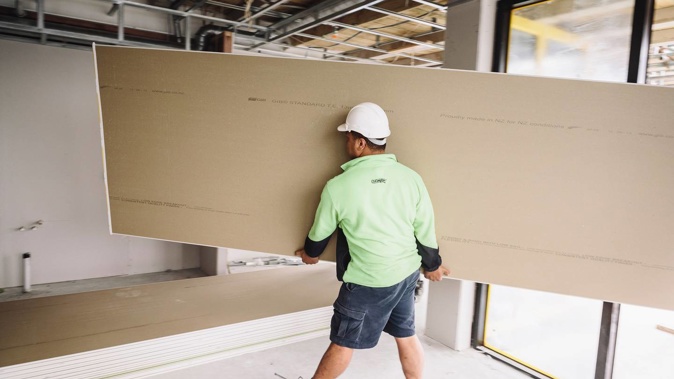
By Nicholas Pointon for RNZ
The plasterboard shortage has eased considerably amid greater supply and slowing demand.
Fletcher Building, which has a near monopoly on the plasterboard market with its GIB Board branded product, came under intense scrutiny from investors, the construction industry and even the government, due to widespread shortages of the basic building material in June.
Supply of the plasterboard became stretched following a surge in demand from the residential construction sector, resulting in months long delays to get product for builders.
Fletchers said in June it expected the market would return to "equilibrium" by October after it announced a raft of moves which it said would lift supply by 10 percent.
Christchurch-based Co-operative Building Supplies chairman Carl Taylor said since then, supply had improved a "fair bit" but it was not back to levels seen pre-Covid.
"Although you might rock on down to your merchant [it would] be very unlikely that you would see GIB Board on the shelves. But if you are ordering a house-lot, it appears it's back to normal ordering levels."
He said lead times for orders had reduced from about six to seven months earlier in the year to about a month.
Supply had also been helped by distributors importing more product from overseas as well, he said.
Leading building firm Naylor Love's chief executive Rick Herd, who was a member of the ministerial taskforce set up to address the shortage, said demand had also eased.
"Yes, Fletchers has upped their game a little bit in regard to production, but there had also been a bit of downturn in market demand, which I think has been very helpful."
He said imports of substitute products had been helpful, but it had not been a game changer.
Another building supplier spoken to RNZ told a similar story.
Fletcher Building responds
In a statement, Fletcher Building's chief executive of the building products division Hamish McBeath said it believed the worst of the shortages were over.
Merchant backlogs were reduced in some regions and wait times were moving toward a three to four week lead time for residential sites, he said.
"Demand is still high; however, it is not at the intensity it was earlier this year and we are seeing positive trends of moving back to more 'normalised' levels of demand," McBeath said.
"The plasterboard allocation model put in place in July has helped us do this by creating better visibility of the true levels of demand for plasterboard."
Upgrades at their Auckland factory had contributed to a rise in production from 2.9 million square metres of GIB a month to 3.25 million square metres.
And the company's new Tauranga factory, expected to open by May next year, could increase production by another 30 percent, he said.
McBeath expected demand for plasterboard would 'normalise' in the next six months.
The GIB Board crisis
Scrutiny of the plasterboard market reached boiling point in June when KiwiSaver provider and social housing developer Simplicity publicly fired Fletcher Building as its plasterboard supplier because of ongoing product delays.
The Minister for Building and Construction Megan Woods set up a ministerial taskforce of industry leaders to address the shortages.
It was asked to consider whether regulation for alternative products was needed, ways to streamline the use of untested materials, new distribution models, and advice on consent approaches.
Herd said the taskforce had improved education for consenting authorities and contractors about alternative products.
"They got a better understanding of ... the processes they need to go through if they want to introduce a new product and what products are available that they can use now," Herd said.
However, he said there had been a "very minor" and "temporary" increase in GIB Board substitutes.
"I think you'll find, particularly the smaller operators, the residential operators, will go back to their tried and tested GIB Board."
"Bigger organisations, such as Naylor Love, will probably continue to try and support imported product where they can."
Herd said the taskforce had been asked to stay on and keep working on preventing acute product shortages - such as the one seen in the plasterboard market - from happening again.
Take your Radio, Podcasts and Music with you









